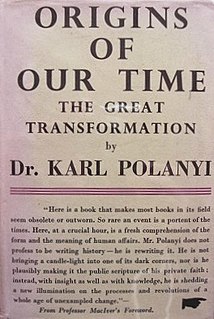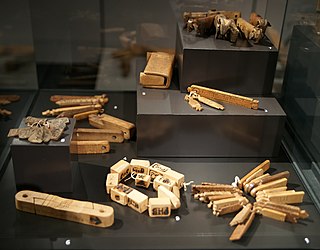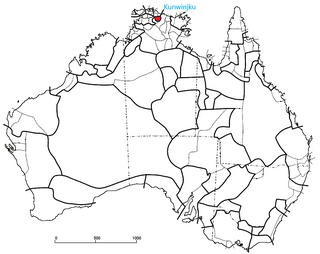
In trade, barter is a system of exchange in which participants in a transaction directly exchange goods or services for other goods or services without using a medium of exchange, such as money. Economists distinguish barter from gift economies in many ways; barter, for example, features immediate reciprocal exchange, not one delayed in time. Barter usually takes place on a bilateral basis, but may be multilateral. In most developed countries, barter usually exists parallel to monetary systems only to a very limited extent. Market actors use barter as a replacement for money as the method of exchange in times of monetary crisis, such as when currency becomes unstable or simply unavailable for conducting commerce.

Commodity money is money whose value comes from a commodity of which it is made. Commodity money consists of objects having value or use in themselves as well as their value in buying goods. This is in contrast to representative money, which has no intrinsic value but represents something of value such as gold or silver, in which it can be exchanged, and fiat money, which derives its value from having been established as money by government regulation.
A local exchange trading system is a locally initiated, democratically organised, not-for-profit community enterprise that provides a community information service and records transactions of members exchanging goods and services by using locally created currency. LETS allow people to negotiate the value of their own hours or services, and to keep wealth in the locality where it is created.

A gift economy or gift culture is a system of exchange where valuables are not sold, but rather given without an explicit agreement for immediate or future rewards. Social norms and customs govern giving a gift in a gift culture; although there is some expectation of reciprocity, gifts are not given in an explicit exchange of goods or services for money, or some other commodity or service. This contrasts with a barter economy or a market economy, where goods and services are primarily explicitly exchanged for value received.
Economic anthropology is a field that attempts to explain human economic behavior in its widest historic, geographic and cultural scope. It is an amalgamation of economics and anthropology. It is practiced by anthropologists and has a complex relationship with the discipline of economics, of which it is highly critical. Its origins as a sub-field of anthropology began with work by the Polish founder of anthropology Bronislaw Malinowski and the French Marcel Mauss on the nature of reciprocity as an alternative to market exchange. For the most part, studies in economic anthropology focus on exchange.

A financial transaction is an agreement, or communication, between a buyer and seller to exchange goods, services, or assets for payment. Any transaction involves a change in the status of the finances of two or more businesses or individuals. A financial transaction always involves one or more financial asset, most commonly money or another valuable item such as gold or silver.
In cultural anthropology, reciprocity refers to the non-market exchange of goods or labour ranging from direct barter to forms of gift exchange where a return is eventually expected as in the exchange of birthday gifts. It is thus distinct from the true gift, where no return is expected.

David Rolfe Graeber was an American anthropologist and anarchist activist. His influential work in economic anthropology, particularly his books Debt: The First 5,000 Years (2011) and Bullshit Jobs (2018), and his leading role in the Occupy movement, earned him recognition as one of the foremost anthropologists and left-wing thinkers of his time.

The Great Transformation is a book by Karl Polanyi, a Hungarian-American political economist. First published in 1944 by Farrar & Rinehart, it deals with the social and political upheavals that took place in England during the rise of the market economy. Polanyi contends that the modern market economy and the modern nation-state should be understood not as discrete elements but as the single human invention he calls the "Market Society".

The history of money concerns the development throughout time of systems that provide the functions of money. Such systems can be understood as means of trading wealth indirectly; not directly as with bartering. Money is a mechanism that facilitates this process.

The Tsimihety are a Malagasy ethnic group who are found in the north-central region of Madagascar. Their name means "those who never cut their hair", a behavior likely linked to their independence from Sakalava kingdom, located to their west, where cutting hair at the time of mourning was expected. They are found in mountainous part of the island. They are one of the largest Malagasy ethnic groups and their population estimates range between 700,000 and over 1.2 million. This estimation places them as the fourth-largest ethnicity in Madagascar.

Money is any item or verifiable record that is generally accepted as payment for goods and services and repayment of debts, such as taxes, in a particular country or socio-economic context. The primary functions which distinguish money are as a medium of exchange, a unit of account, a store of value and sometimes, a standard of deferred payment.

Credit theories of money, also called debt theories of money, are monetary economic theories concerning the relationship between credit and money. Proponents of these theories, such as Alfred Mitchell-Innes, sometimes emphasize that money and credit/debt are the same thing, seen from different points of view. Proponents assert that the essential nature of money is credit (debt), at least in eras where money is not backed by a commodity such as gold. Two common strands of thought within these theories are the idea that money originated as a unit of account for debt, and the position that money creation involves the simultaneous creation of debt. Some proponents of credit theories of money argue that money is best understood as debt even in systems often understood as using commodity money. Others hold that money equates to credit only in a system based on fiat money, where they argue that all forms of money including cash can be considered as forms of credit money.

The Gunwinggu (Kunwinjku) people are an Australian Aboriginal people, one of several groups within the Bininj people, who live around West Arnhem Land to the east of Darwin, Northern Territory. Kunwinjku people generally refer to themselves as "Bininj" in much the same way that Yolŋu people refer to themselves as "Yolŋu".

Debt: The First 5,000 Years is a book by anthropologist David Graeber published in 2011. It explores the historical relationship of debt with social institutions such as barter, marriage, friendship, slavery, law, religion, war and government. It draws on the history and anthropology of a number of civilizations, large and small, from the first known records of debt from Sumer in 3500 BC until the present.

In macroeconomics, chartalism is a heterodox theory of money that argues that money originated historically with states' attempts to direct economic activity rather than as a spontaneous solution to the problems with barter or as a means with which to tokenize debt, and that fiat currency has value in exchange because of sovereign power to levy taxes on economic activity payable in the currency they issue.

The Utopia of Rules: On Technology, Stupidity, and the Secret Joys of Bureaucracy is a 2015 book by anthropologist David Graeber about how people "relate to" and are influenced by bureaucracies. Graeber previously wrote Debt: The First 5000 Years and The Democracy Project, and was an organizer behind Occupy Wall Street. Graeber signed a book deal with Melville House toward the end of 2014, and The Utopia of Rules was released on February 24, 2015.

The Democracy Project: A History, a Crisis, a Movement is anthropologist David Graeber's 2013 book-length, inside account of the Occupy Wall Street. Graeber evaluates the beginning of the movement, the source of its efficacy, and the reason for its eventual demise. Interspersed is a history of democracy, both direct and indirect, throughout many different times and places. In contrast to many other evaluations of OWS Graeber takes a distinctly positive tone, advocating both for the value of OWS and its methods of Direct democracy. The book was published by Spiegel & Grau.
Christopher A. Gregory is an Australian economic anthropologist. He is based at Australian National University (ANU) in Canberra, and has also taught at University of Manchester- where he was made Professor of Political and Economic Anthropology. He studied Economics at University of New South Wales and ANU before pursuing anthropology, following a period in Papua New Guinea. His main research has been in Papua New Guinea and Bastar District, central India, and he also co-authored a research methods manual for economic anthropology, 'Observing the Economy', with Jon Altman.
David Graeber was an American anthropologist and social theorist. Unless otherwise noted, all works are authored solely by David Graeber.